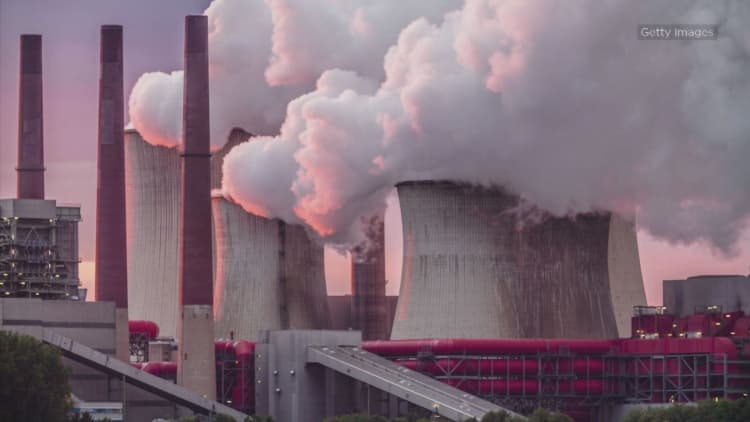The Trump administration and Republican lawmakers are moving to repeal part of a law aimed at curbing corruption in the global energy and mining sectors.
The effort is the latest in a GOP-led retreat from a campaign to promote transparency in the oil, gas and mineral extraction business. It comes even as Europe and Canada are requiring their energy and mining companies to disclose payments to foreign governments, which are aimed at reining in the graft that has long plagued resource-rich countries.
The U.S. anti-corruption measure on the chopping block would require drilling and mining companies listed on U.S. stock exchanges to report their payments to foreign governments.
Who benefits from keeping the public in the dark? Secrecy breeds corruption.Sen. Ben Cardin and former Sen. Richard Lugar
By making the information public, the measure aims to empower citizen groups in resource-rich nations to hold governments and state-owned companies accountable for oil, gas and mineral revenues. Energy industry corruption that enriches elites at the expense of ordinary people is a common problem in many parts of the developing world.
Democratic Sen. Ben Cardin and Republican former Sen. Richard Lugar sought to alleviate this "resource curse" by introducing the transparency measure as an amendment to the sweeping 2010 Dodd-Frank financial reform. The amendment required the Securities and Exchange Commission to create a disclosure rule.
The SEC created the rule last year, but Republicans struck it down in February by using rarely invoked congressional power to overturn recently implemented regulations. However, the Cardin-Lugar Amendment is still on the books, so the SEC has to create a new rule to replace the one Republicans killed.
Now, GOP lawmakers are taking aim at the amendment itself. The House Financial Services Committee on Wednesday advanced a bill introduced by Rep. Bill Huizenga, R-Mich., that would repeal the measure. The bill advanced through the markup on a party-line vote, with only Republican congressman Ed Royce of California joining Democrats in opposing repeal.

Cardin and Lugar on Wednesday urged House members to stop the bill in its tracks.
"Today, the House Financial Services Committee made the wrong decision when it passed H.R. 4519, a bill seeking to shield the extractives industry from fully disclosing their payments made to governments for oil, gas and mining. Who benefits from keeping the public in the dark? Secrecy breeds corruption," Cardin and Lugar said in a statement before the committee.
Arguing the SEC's role
Huizenga on Tuesday argued that the SEC is not the appropriate agency to deal with the problem.
He said the Cardin-Lugar Amendment's goal is "laudable," but "using federal securities law and the SEC to enforce social issues is inconsistent with the SEC's core mission and completely inappropriate."
"Just to remind everyone, the SEC's mission is to 1) protect investors; 2) maintain fair, orderly, and efficient markets; and, 3) facilitate capital formation," he said in a prepared statement.
The Trump administration shares that view. In an October report, the Treasury Department urged Congress to repeal the measure, saying several other agencies are better equipped than SEC to handle the issue.
Global Witness, a pro-transparency nonprofit, argues the measure aligns with the SEC's mission.
It notes that investors with nearly $10 trillion of assets under management wrote to the SEC in support of the rule. Further, the EU and Canada created similar rules, so a U.S. measure would improve market efficiency by harmonizing regulations that govern multinational companies. Last, Global Witness says oil and mining corruption is damaging to investment markets and capital formation.

Opponents say the Cardin-Lugar Amendment disadvantages U.S. companies by forcing them to disclose private information and would potentially cost them contracts with foreign nations. The measure's backers say these claims are bogeymen and there is no hard evidence to back them.
"Oil, gas and mining companies from other countries have already disclosed over $150 billion in payments under mandatory transparency rules," Corinna Gilfillan, head of Global Witness' U.S. office, said in a statement on Wednesday.
U.S. retreating from anti-corruption campaigns
U.S. oil majors such as Exxon Mobil and Chevron have highlighted their efforts to promote transparency, but they have opposed turning over certain tax documents, creating an obstacle to their participation in anti-corruption campaigns.
Last month, the Trump administration halted plans for the United States to become a full member of the Extractive Industries Transparency Initiative, an international program aimed at encouraging resource payment disclosures. The Interior Department said some EITI standards clash with the "U.S. legal framework."
Cardin and Lugar argued that there are no laws that prevent the United States from complying with EITI, a voluntary reporting program that complements the Cardin-Lugar amendment.
Earlier this year, an Interior Department spokesperson denied the agency was planning to pull out of EITI. The spokesperson made the claims after CNBC inquired about reports that Interior officials had canceled all of the remaining scheduled meetings with U.S. nonprofit and industry groups linked to EITI.
WATCH: One mining name that's rallying back



